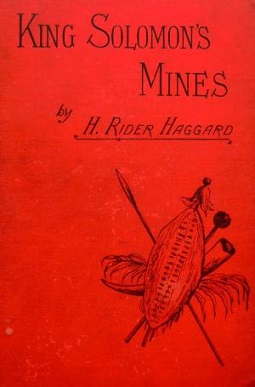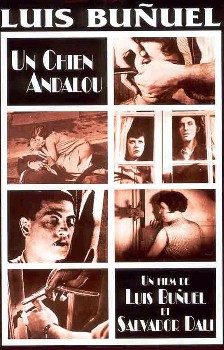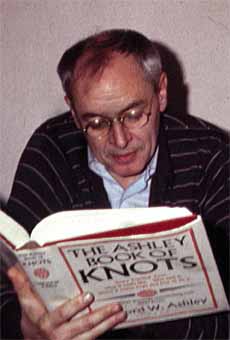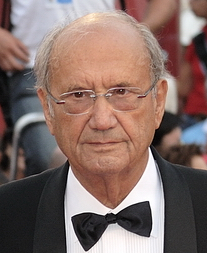Related Research Articles

John Grierson was a pioneering Scottish documentary maker, often considered the father of British and Canadian documentary film. In 1926, Grierson coined the term "documentary" in a review of Robert J. Flaherty's Moana.

Salvador Domingo Felipe Jacinto Dalí i Domènech, Marquess of Dalí of Púbol, known as Salvador Dalí, was a Spanish surrealist artist renowned for his technical skill, precise draftsmanship, and the striking and bizarre images in his work.

King Solomon's Mines (1885) is a popular novel by the English Victorian adventure writer and fabulist Sir H. Rider Haggard. It tells of an expedition through an unexplored region of Africa by a group of adventurers led by Allan Quatermain, searching for the missing brother of one of the party. It is one of the first English adventure novels set in Africa and is considered to be the genesis of the lost world literary genre. Haggard dedicated this book to his childhood idol Humphry Davy.

Federico del Sagrado Corazón de Jesús García Lorca, known as Federico García Lorca, was a Spanish poet, playwright, and theatre director. García Lorca achieved international recognition as an emblematic member of the Generation of '27, a group consisting mostly of poets who introduced the tenets of European movements into Spanish literature.

Un Chien Andalou is a 1929 French- Spanish surrealist silent short film directed, produced and edited by Spanish filmmaker Luis Buñuel, who also co-wrote the screenplay with Spanish surrealist painter Salvador Dalí. Buñuel's first film, it was initially released in a limited capacity at Studio des Ursulines in Paris, but became popular and ran for eight months.

Luis Buñuel Portolés was a Spanish and Mexican filmmaker who worked in France, Mexico, and Spain. He has been widely considered by many film critics, historians, and directors to be one of the greatest and most influential filmmakers of all time. Buñuel’s works were known for their avant-garde surrealism which were also infused with political commentary.

L'Age d'Or, commonly translated as The Golden Age or Age of Gold, is a 1930 French surrealist satirical comedy film directed by Luis Buñuel about the insanities of modern life, the hypocrisy of the sexual mores of bourgeois society, and the value system of the Catholic Church. Much of the story is told with title cards like a predominantly silent film. The screenplay is by Buñuel and Salvador Dalí. L'Age d'Or was one of the first sound films made in France, along with Miss Europe and Under the Roofs of Paris.

Ronald David Laing, usually cited as R. D. Laing, was a Scottish psychiatrist who wrote extensively on mental illness—in particular, psychosis and schizophrenia. Laing's views on the causes and treatment of psychopathological phenomena were influenced by his study of existential philosophy and ran counter to the chemical and electroshock methods that had become psychiatric orthodoxy. Laing took the expressed feelings of the individual patient or client as valid descriptions of personal experience rather than simply as symptoms of mental illness. Though associated in the public mind with the anti-psychiatry movement, he rejected the label. Laing regarded schizophrenia as the normal psychological adjustment to a dysfunctional social context, although later in life he revised his views.

Emilio Prados was a Spanish poet and editor, a member of the Generation of '27.

Solomon & Gaenor is a 1999 Welsh film written and directed by British filmmaker Paul Morrison. It stars Ioan Gruffudd as Solomon Lewinsky, an Orthodox Jewish man in early 20th-century Wales who falls in love with a gentile woman named Gaenor Rees, played by Nia Roberts. They enter into a forbidden love affair, which has tragic consequences.

Night Mail is a 1936 British documentary film directed and produced by Harry Watt and Basil Wright, and produced by the General Post Office (GPO) Film Unit. The 24-minute film documents the nightly postal train operated by the London, Midland and Scottish Railway (LMS) from London to Scotland and the staff who operate it. Narrated by John Grierson and Stuart Legg, the film ends with a "verse commentary" written by W. H. Auden to a score composed by Benjamin Britten. The locomotive featured in the film is LMS Royal Scot Class 6115 Scots Guardsman.

Pere Portabella i Ràfols is a Spanish politician, director, and producer. In 1977, he was elected Senator in Spain's first democratic elections and participated in the writing of the Spanish Constitution. As a filmmaker, his style is experimental, reaching new aspects of film language, often with a poetic tone and social content. Portabella is hailed as an iconic figure in Spanish film.

Irvin David Yalom is an American existential psychiatrist who is emeritus professor of psychiatry at Stanford University, as well as author of both fiction and nonfiction.
Daniel Gordon is a British documentary film director known for his documentaries on sports and North Korea.
Surrealist cinema is a modernist approach to film theory, criticism, and production, with origins in Paris in the 1920s. The Surrealist movement used shocking, irrational, or absurd imagery and Freudian dream symbolism to challenge the traditional function of art to represent reality. Related to Dada cinema, Surrealist cinema is characterized by juxtapositions, the rejection of dramatic psychology, and a frequent use of shocking imagery. Philippe Soupault and André Breton’s 1920 book collaboration Les Champs magnétiques is often considered to be the first Surrealist work, but it was only once Breton had completed his Surrealist Manifesto in 1924 that ‘Surrealism drafted itself an official birth certificate.’
K. M. Chaitanya is a film director, documentary maker and theater person. His first feature film Aa dinagalu in Kannada, won several awards including the Filmfare Awards South for Best Director and Best Feature Film in 2007. Chaitanya also won awards for Best Debutant Director by the South Indian Cinematographers' Association, Chennai Film Fans Association and Raghavendra Chitravani Award. Aa Dinagalu was listed by The Week among the top 10 Indian films of 2007. Chaitanya studied Journalism at Christ College.

Little Ashes (2008) is a 2008 Spanish-British drama film directed by Paul Morrison and written by Philippa Goslett. It is set in Spain during the 1920s and 1930s, where three of the era's most creative talents meet at university. Luis Buñuel, later a noted filmmaker, is dismayed as his friends, surrealist painter Salvador Dalí and poet Federico García Lorca, develop a love affair.
Aria Films was set up at the beginning of 2002 as a film production, financing and consultancy outfit by Carlo Dusi. It is based in London.
The Order of Toledo was an avant-garde association of young writers and artists studying in Madrid, Spain, who made frequent weekend trips to nearby Toledo. Members immersed themselves in the mystique of the city's labyrinthine streets and mosaic history to seek out individual and shared adventures. The Order was founded by Luis Buñuel in 1923 and continued accepting members until 1936. Some of its most successful members were Salvador Dalí, Federico García Lorca, and Rafael Alberti.
Eugene Hughes is a UK-based documentary filmmaker and psychotherapist. He is known for the documentary film The Moving Theatre, as well as for establishing Artgym.
References
- 1 2 "Cambridge Tripos Examination results", The Times, 23 June 1966, p. 18.
- ↑ Felperin, Leslie (24 September 2020). "23 Walks review – dog-lovers follow the path to romance". The Guardian . Retrieved 4 November 2023.